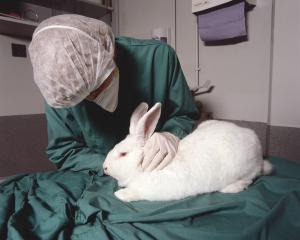
Humans, called to be stewards of creation, are not meant to be parasites taking over and destroying anything and everything around them for the sake of their own inordinate pleasures; rather, they are meant to embrace creation, to integrate with it, to form symbiotic relationships with the various forms of life which they find in it. Different forms of life have their own values which must always be considered when humans interact with them. Each form of life must be respected according to its nature, according to its particular good, but also in accordance to its proper place in the whole of creation. Sentient forms of life have different needs than non-sentient forms of life; when dealing with sentient forms of life, we must take their sentience into consideration. But even non-sentient forms of life have needs which must be respected; we can’t just mistreat them and exploit them because of their lack of sentience. They still have values of their own which we must respect.
Sadly, we live in a time in which people try to figure out how they can best exploit others for their own immediate advantage. We rarely consider the long-term consequences of our actions. Mistreatment of some element of the ecosystem will affect the whole ecosystem. That alone should give us reason to be cautious in relation to how we treat the world around us. But, as Pope Francis in Laudato si’ decried, our culture has suggested us to go into the opposite direction, to exploit and use everything we can for our own pleasure:
The culture of relativism is the same disorder which drives one person to take advantage of another, to treat others as mere objects, imposing forced labour on them or enslaving them to pay their debts. The same kind of thinking leads to the sexual exploitation of children and abandonment of the elderly who no longer serve our interests. It is also the mindset of those who say: Let us allow the invisible forces of the market to regulate the economy, and consider their impact on society and nature as collateral damage. In the absence of objective truths or sound principles other than the satisfaction of our own desires and immediate needs, what limits can be placed on human trafficking, organized crime, the drug trade, commerce in blood diamonds and the fur of endangered species? Is it not the same relativistic logic which justifies buying the organs of the poor for resale or use in experimentation, or eliminating children because they are not what their parents wanted?[1]
While Pope Francis is right to be concerned with the way we treat each other, what he said in regards exploitation remains true in regards the way we treat the earth and its inhabitants. We have turned the whole of creation into something to be exploited. We see everything in it as mere building blocks to be used without consideration of their own particular good. Indeed, this attitude towards creation, a sentiment which has significantly developed within the past few centuries, can be seen as being a part of the reason why our society as a whole is composed of exploiters and the exploited (many of whom would be exploiters if they could). When believe we do nothing wrong when we exploit other sentient life forms, it easily leads us to believe there will be no problem if we exploit another person. We will use the same kind of logical analysis and reasoning which we use to exploit our non-human neighbors to justify our mistreatment of our neighbors. Unbridled and abusive animal experimentation, which sometimes grants us new scientific insights, is seen as acceptable because of what we gain from it. But does not that logic suggest human experimentation, which likewise will grant us scientific advances, should be acceptable? When the exploitation of animals becomes justified by what is produced, when the ends justifies the means, then those people who are deemed as expendable easily find themselves used for similar inhumane experiments. The ends, after all, justify the means. C.S. Lewis understood this, explaining that what we saw coming out of Dachau and Hiroshima was the end product of the ideology which lay behind vivisection:
The victory of vivisection marks a great advance in the triumph of ruthless, nonmoral utilitarianism over the old world of ethical law; a triumph in which we, as well as animals, are already the victims, and of which Dachau and Hiroshima mark the more recent achievements. In justifying cruelty to animals we put ourselves also on the animal level. We choose the jungle and must abide by our choice.[2]
Our mistreatment of animals has led us to accept the mistreatment of humanity. After all, humans are animals as well. To overcome this dark legacy, we must question and stop whatever inhumane experimentation is being done on animals. This is not to say there can be no forms of animal experimentation, because not all experiments are needlessly cruel. Some are benevolent and take their welfare into consideration. Whenever animal experimentation is done, it should be done with the good of the animals kept in focus. For just as there can be, and remains, various ethical ways to engage medical experiments on humans, looking for cures for various diseases like cancer, so there can be various kinds of experiments with animals which are geared towards the good of the animal instead of the mere exploitation of the animal for some human-centered end.[3] In this fashion, Andrew Linzey explained:
When animals are used so that their own lives are enhanced, supported, or protected in some way, the motivation is more than simple human self-seeking. What is not justifiable is the intention to so use and take over the natural life of animals that its reward for humans is seen as its only reason for existing. The doctrine of creation will not allow us unrestricted and unrestrained use of the animal world for human purposes.[4]
The doctrine of creation sees that all things in creation must be respected according to its own innate goodness. When dealing with animals, we can certainly learn much from them, but we must do so in a way respecting them and their own particular value. We can learn many things conducting experiments with animals, but such experiments must meet with ethical standards, whereby we do not needlessly inflict pain and suffering on them, nor think that our own scientific curiosity or some purely-human centered goal is enough to justify such pain.[5] The rebuke of Balaam’s ass to Balaam can be, and should be, seen as a rebuke to all of us who take no care or concern for the welfare of animals and mistreat them: “What have I done to you, that you have struck me these three times?”(Num. 22:29b RSV). What have animals done to us that we strike them, that we treat them with cruelty?
We, therefore, must treat animals with care; there might be times in which we cause them pain, just as there are times when we might cause someone else pain. The pain should be secondary and controlled, eliminated if possible. But at times, as C. S. Lewis, recognized, the evil of pain itself might be a necessary evil:
Now if pain is an evil then the infliction of pain, considered in itself, must clearly be an evil act. But there are such things as necessary evils. Some acts which would be bad, simply in themselves, may be excusable and even laudable when they are necessary means to a greater good. In saying that the infliction of pain, simply in itself, is bad, we are not saying that pain ought never to be inflicted. Most of us think that it can rightly be inflicted for a good purpose—as in dentistry or just and reformatory punishment. The point is that it always requires justification. On the man whom we find inflicting pain rests the burden of showing why an act which in itself would be simply bad is, in those particular circumstances, good.[6]
When we deal with animals, or anything else in creation, we must justify our actions; we must discern that what we do respects the good of all, and not just our own. That is, if we want to overcome the “culture of relativism” which looks at anything beyond ourselves as being objects to be exploited, we must do this not just for fellow humanity, but with everything. Sentient creatures, because of their sentience, require greater care and concern on our part than non-sentient forms of life, which likewise must have more of our care and concern than immaterial objects. But even immaterial objects must not be abused needless, for the whole of creation is inter-related; we must not defile the land; this should be common sense, because when we defile the land, what lives on the land will likewise be defiled.
Some might object and say that criticism of animal experimentation lies with an emotional appeal, that animals are over sentimentalized; to be sure, pictures of suffering animals from such exploitation are used to demonstrate the cruelty of such experimentation, but the criticism does not stand because our actions must be holistic. Emotional responses to cruelty must not be ignored. They indicate the effect such cruelty has on our conscience. To discount the emotional response is to silence our conscience. Cold utilitarian logic could be used to justify exploitation, but only because such logic is founded upon false premises, premises which our conscience can and should be able to see through even if intellectually we cannot. This is as it should be, because we are dealing with what is good, with a transcendental reality which we participate in and share and yet is beyond us; religion engage emotions for this very reason.[7]
Exploitation of the world is evil. It ignores the good of the world, the good which was given to it by its creator. We were given stewardship of the earth to help protect it, not defile it. We are not meant to abuse it, but rather to look after it and care for it, because it is God’s. We must not act like parasites, seeking that which we can devour, letting the rest go to rot. We cannot look to the world as something to exploit, nor think its creatures are there merely for us to do as we will. Rather, creation is the Lord’s (cf. Ps. 24:1), and all that is within it is to be honored because they belong to God.
[1] Pope Francis, Laudato si’. Vatican translation. ¶123.
[2] C.S. Lewis, “Vivisection” in Undeceptions: Essays on Theology and Ethics. Ed. Walter Hooper (London: Geoffrey Bles, 1971), 186.
[3] For this reason, Bernard Foëx suggested that the ethical practices developed for clinical research, what borrows from many different philosophical perspectives, should be employed when dealing with animal experimentation: “Part of the problem, when invoking moral philosophy to solve the ethical problem of animal experimentation, is the tendency to try to resolve it using a single philosophical construct, be it utilitarianism, a rights‐based approach, or contractualism, or any other. Instead, an approach similar to that used to resolve ethical dilemmas in clinical practice may be more helpful. This will include elements of all these principles,” Bernard A Foëx, “The Ethics of Animal Experimentation” in Emergency Medicine Journal 2007 (24): 750.
[4] Andrew Linzey, Animal Theology (Chicago: University of Illinois Press, 1995), 107.
[5] As many ethical requirements are necessary to be fulfilled to use human subjects in various experiments, we must create a list of such requirements when dealing with similar forms of animal research. All experimentation which is done on animals merely for the sake of some human pleasure, like the use of makeup on animals, must be rejected. Other experimentation, such as testing an experimental medicine on an animal which suffers a malady that no other cure has been shown to help, might be acceptable if other ethical necessities are met (the same which are expected when dealing with humans). Nonetheless, with such medical experimentation, there must be a good reason to suspect the experimental medicine could be of benefit, and the likelihood of the benefit is greater than the likelihood of greater harm being done to the animal as a result of the research. Because animals cannot give the same kind of consent as human test subjects, care must be had to determine the kind of response would be given in an analogous situation with human test subjects. If there is evidence that people would reject such an experiment on themselves, we can assume, unless there are solid reasons to the contrary, that no animal should be treated with a similar experiment. Babies, sometimes, have experiments done on them, but they have parents or other guardians looking after their rights; it might be necessary to have some sort of equivalent person whose sole purpose is to look after the welfare of animals, so that they must be convinced, like a parent with a baby, that a particular experiment is acceptable before it is allowed.
[6] C.S. Lewis, “Vivisection,” 183.
[7] “Like art, religion is not an emotionless affair of pure intellect. Awe, faith, righteousness, abasement, worship, seeking salvation – all have emotional components,” Jeffrey Moussaieff Masson and Susan McCarthy, When Elephants Weep (New York: Doubleday, 1995), 213.
Stay in touch! Like A Little Bit of Nothing on Facebook.
If you have liked what you read, please consider sharing it with your friends and family!













